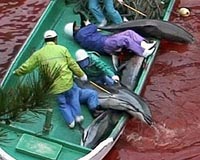| . |  |
. |
Boulder CO (SPX) Oct 22, 2009 Supervolcanoes and cosmic impacts get all the terrible glory for causing mass extinctions, but a new theory suggests lowly algae may be the killer behind the world's great species annihilations. Today, just about anywhere there is water, there can be toxic algae. The microscopic plants usually exist in small concentrations, but a sudden warming in the water or an injection of dust or sediment from land can trigger a bloom that kills thousands of fish, poisons shellfish, or even humans. James Castle and John Rodgers of Clemson University think the same thing happened during the five largest mass extinctions in Earth's history. Each time a large die off occurred, they found a spike in the number of fossil algae mats called stromatolites strewn around the planet. Castle will be presenting the research on Monday, 19 October at the annual meeting of the Geological Society of American in Portland, Oregon. "If you go through theories of mass extinctions, there are always some unanswered questions," Castle said. "For example, an impact - how does that cause species to go extinct? Is it climate change, dust in the atmosphere? It's probably not going to kill off all these species on its own." But as the nutrient-rich fallout from the disaster lands in the water, it becomes food for algae. They explode in population, releasing chemicals that can act as anything from skin irritants to potent neurotoxins. Plants on land can pick up the compounds in their roots, and pass them on to herbivorous animals. If the theory is right, it answers a lot of questions about how species died off in the ancient world. It also raises concerns for how today's algae may damage the ecosystem in a warmer world. "Algae growth is favored by warmer temperatures," Castle said. "You get accelerated metabolism and reproduction of these organisms, and the effect appears to be enhanced for species of toxin-producing cyanobacteria." He added that toxic algae in the United States appear to be migrating slowly northward through the country's ponds and lakes, and along the coast as temperatures creep upward. Their expanding range portends a host of problems for fish and wildlife, but also for humans, as algae increasingly invade reservoirs and other sources of drinking water. Share This Article With Planet Earth
Related Links Geological Society of America Darwin Today At TerraDaily.com
 Japan dolphin hunting town threatens to sue over 'The Cove'
Japan dolphin hunting town threatens to sue over 'The Cove'Tokyo, Japan (AFP) Oct 21, 2009 A town at the centre of a controversial dolphin slaughtering documentary could sue the film makers, local fisheries officials said Wednesday, as it premiered at a Tokyo film festival. "The Cove", an award-winning film depicting the annual slaughter of dolphins in the Japanese coastal town of Taiji, has caused uproar in the town, with film makers accused of covertly shooting footage using ... read more |
|
| The content herein, unless otherwise known to be public domain, are Copyright 1995-2009 - SpaceDaily. AFP and UPI Wire Stories are copyright Agence France-Presse and United Press International. ESA Portal Reports are copyright European Space Agency. All NASA sourced material is public domain. Additional copyrights may apply in whole or part to other bona fide parties. Advertising does not imply endorsement,agreement or approval of any opinions, statements or information provided by SpaceDaily on any Web page published or hosted by SpaceDaily. Privacy Statement |